We put our tenants and customers at the heart of everything we do, helping people build better lives, meet their individual needs, and support them to live independently through specialist supported housing, technology-enabled care, and other preventative and critical support services.
A leader in supported living
As RWP, we are one of the UK’s leading providers of supported living accommodation for autistic adults, people with a learning disability, and mental health needs. We are responsible for over 4,000 supported living properties across the UK.
Throughout the year, we have continued to develop our specialist teams and services based on the specific needs of our tenants. In January 2024, following feedback and consultation with our tenants and support providers, we successfully introduced a caretaking service at our Sutton schemes in London. This has enabled support providers to focus their time better on meeting the needs of our tenants.
We have remodelled our repair service on a regional basis so that we can provide a better and faster service for our tenants. We also developed new supported living properties to extend our services to more people, creating 35 supported living tenancies. Several properties enabled individuals with high support needs to move out of institutional settings to new homes in the community. We also bought the freehold of some properties that we previously leased, further increasing the security of tenure.
In 2023/24, we completed 485 adaptations, including providing thumb-turn locks for easier access for tenants, installing ramps and handrails for level access at properties, and accessible bathing facilities. We also undertake environmental improvements that are outside our gardening service. We funded 201 environmental jobs, including removing fallen trees, carrying out large-scale garden cutbacks, jet washing, and improving boundaries.
We created six tenant engagement hubs across England and Wales that provide in-person engagement opportunities. Around 40 meetings took place at the hubs during the year, enabling tenants to voice their views and aspirations and influence our services. Our RWP tenants continue to access funds for projects from our Community Investment Fund. The gardening projects, in particular, remain popular because they are outdoor-based and promote wellbeing and a sense of community, reflecting tenant preferences for activities that enhance their quality of life.
We take pride in providing specialist, uniquely tailored, supported living housing. We keep our tenants at the heart of everything we do, aiming to provide homes that meet their needs and help them live independently. We actively engage with our tenants, incorporate their feedback, and ensure that our services evolve to meet their expectations and needs.
However, there is still a significant unmet demand for supported living accommodation. As an active member of the Learning Disability and Autism Housing Network (LDAHN), we advocate for more high-quality housing for people with learning disabilities and autism. We also work to influence legislation, such as the Supported Housing (Regulatory Oversight) Act. We are also members of Learning Disability England and support their Vision for Change campaign.
In 2024, we will establish our new RWP tenant committee, which will play a crucial role in reviewing the results of our Tenant Satisfaction Measures and complaints. The committee will be made up of tenants and tenant representatives who will share their views and experiences and help influence change and drive improvement.
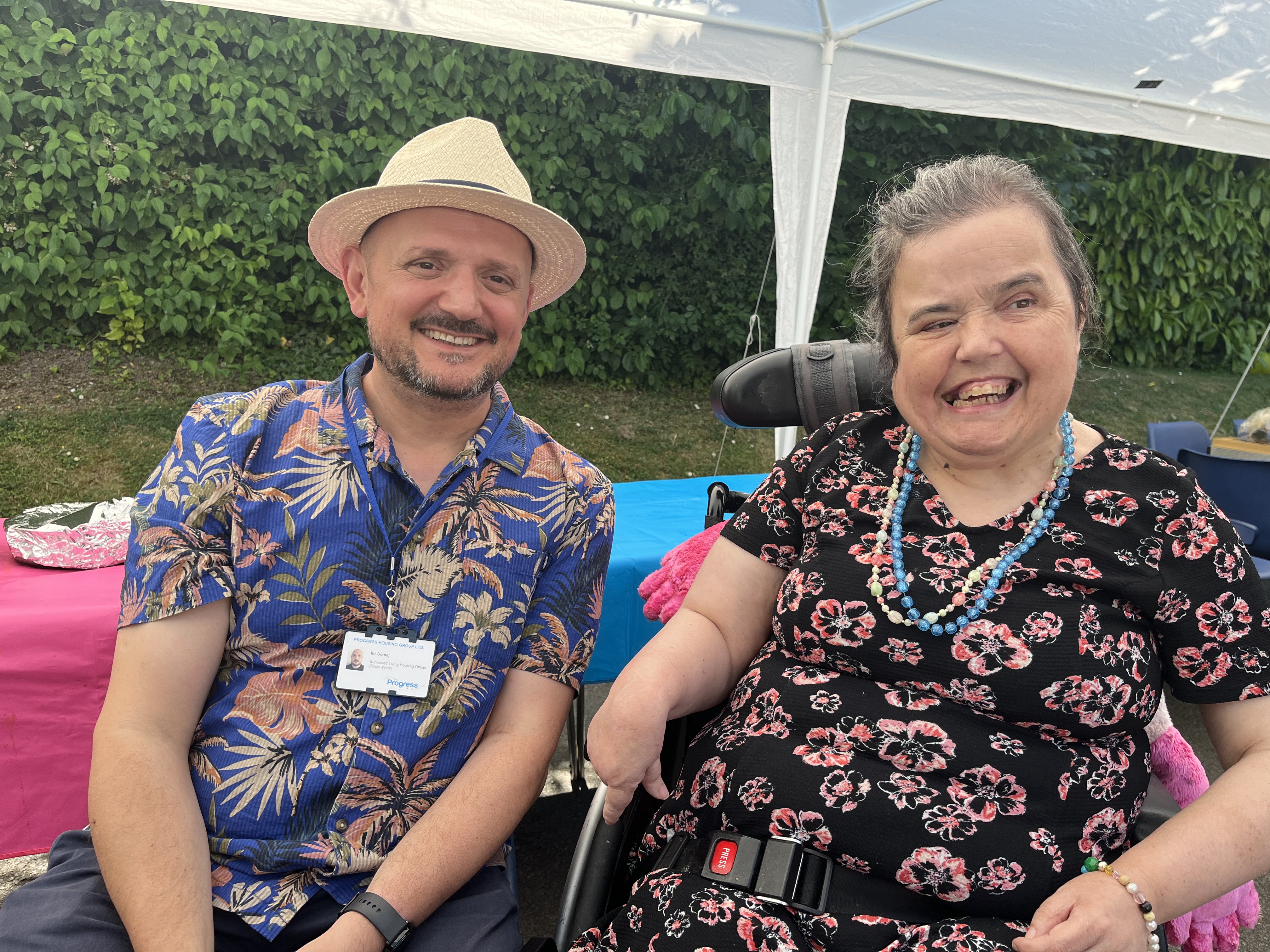
Garden party at Lily Marriott supported living scheme
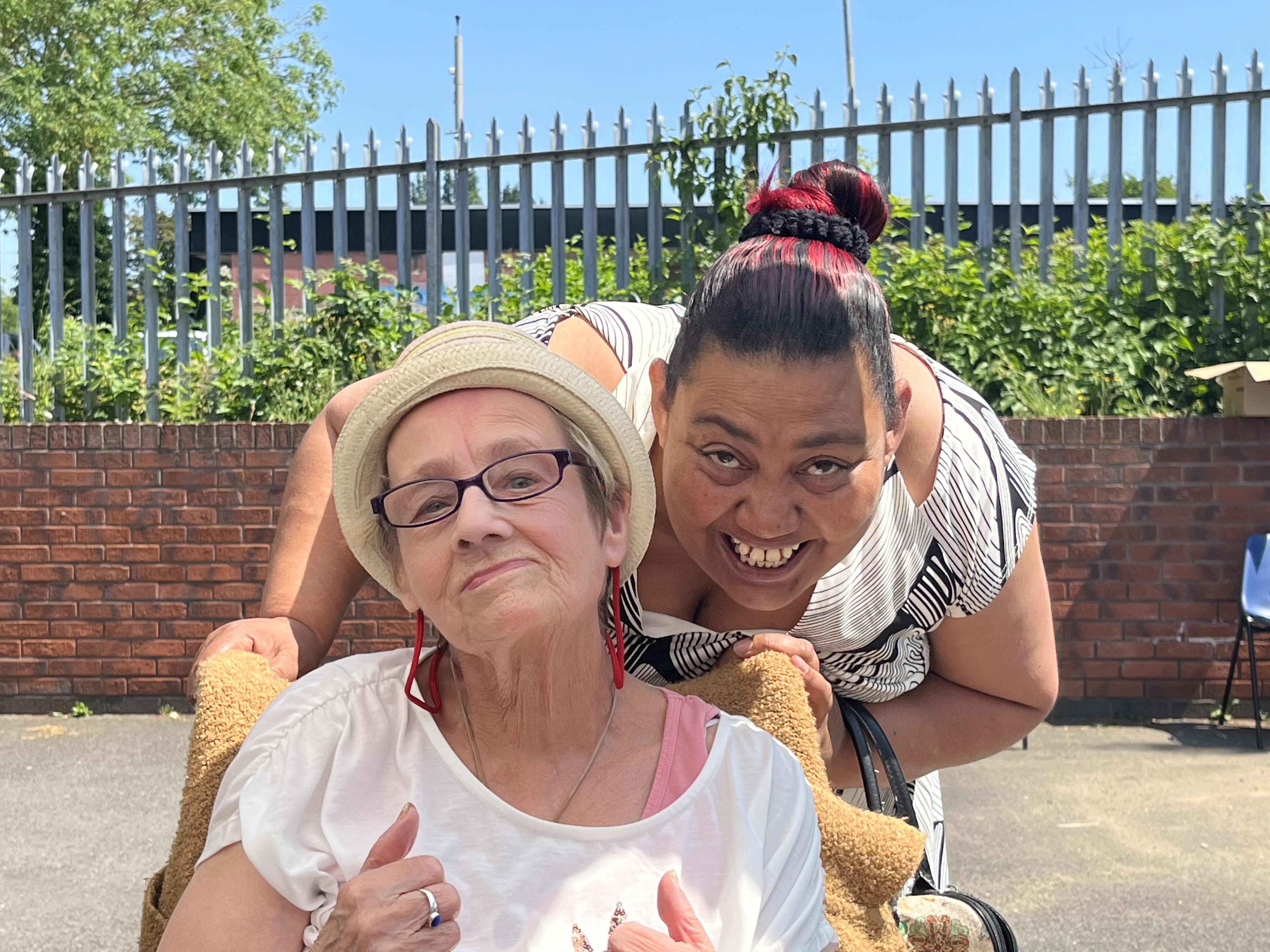
Garden party at Lily Marriott supported living scheme

Lily Marriott tenant and support worker
In 2024, we will establish our new RWP tenant committee, which will play a crucial role in reviewing the results of our Tenant Satisfaction Measures and complaints.
Key Unlocking Futures
Through our charity, Key Unlocking Futures (Key), we support people across Lancashire, helping them build a brighter future for themselves and their families. We help people find a home, improve their health and wellbeing, connect with others in the community, and stay safe. We provided services to over 7,000 people across the county during the year.
Support for children
We offer emotional health and wellbeing support in schools for children aged 4 to 18. This includes therapeutic support, counselling, and cognitive behavioural therapy. Our experienced employees provide support for families with children with autism or showing autistic traits while awaiting diagnosis. In response to requests, we have also introduced peer support groups for families with children with autism.
Preventing homelessness
This year, our supported housing schemes in Preston and Chorley provided safe accommodation and support to 68 young people and adults at risk of homelessness. 97% of these individuals have successfully transitioned to planned arrangements. Additionally, Inn2 in Preston has been repurposed and is starting to provide accommodation for 6 care leavers aged 18 and over. Key has also successfully registered with OFSTED to meet the new requirements outlined in the Supported Accommodation Regulations and Quality Standards.
Providing refuge
We help people who have experienced or are at risk of domestic abuse and violence. We manage the women's refuges in South Ribble and Chorley. This year, we provided safe accommodation to 52 women and 63 children at our refuges, and we achieved Women’s Aid Accreditation for our domestic abuse services.
This year, our supported housing schemes in Preston and Chorley provided safe accommodation and support to 68 young people and adults at risk of homelessness.

Real stories
Meet Rob
I've been living here for a year and have had lots of help from my support workers to live independently. I can't wait to move into my own place now.
I was 16 when I found myself rough sleeping on benches in the local park. My mum and me had a big row one day, and I had left and moved in with my auntie. I felt bad, though, because my auntie had enough going on with her own family, and so I told her I was going to stay with a friend. The truth was I had nowhere to go, so I slept rough for a couple of weeks in the local park.
Someone reported me sleeping there, and I was encouraged to come and stay at a supported housing scheme for young people run by Key. I’ve been here a year now, and I get help from my support workers. They arrange my prescriptions as I have a medical condition and help me budget.
Since moving here, I am in touch with my mum on and off. She sometimes brings me food, or I will call and see her. It’s her birthday today, so I’m going to buy her a candle or something tomorrow, when I get paid. I’m actually working on a placement at the moment clearing void properties, getting rid of furniture, for a local housing association.
I really like it. Everyone is nice to me, and it keeps me occupied. The work has given me a routine instead of staying in bed all day. When this ends, I want to get an apprenticeship. Key has said they will help me find future opportunities. I’m also looking forward to moving.
Real stories
Meet Sarah
Sarah’s journey through Key’s refuge services highlights the impact of compassionate support on survivors of domestic abuse.
After enduring years of emotional and physical trauma, Sarah found refuge at Clare House, where Key provided safe accommodation and comprehensive domestic abuse services.
Reflecting on her experience, Sarah describes a big change in herself. "I’ve just come back from the gym where I’ve been doing deadlifts! I am so much stronger now, both mentally and physically. My abuser always said I was weak, but I was brought up with three brothers; I am anything but weak.”
The refuge became a sanctuary where Sarah and her children found safety and support. "I cannot put into words just how much of a positive impact the refuge has had on my life, on my children’s lives, and on the lives around me.
The team at the refuge would listen without judgment and wouldn’t patronise; they were genuine. I recognise now that they were motherly and caring. I’ve come such a long way, and I’ve changed so much. I am a better communicator, and my mind is much healthier. I’m able to counsel those around me.
I’ve been able to share what I have learned, helping to empower other women."
Through Key’s support, Sarah has rebuilt her life and become an advocate for change in her community.
I’ve come such a long way, and I’ve changed so much. I am a better communicator, and my mind is much healthier. I’m able to counsel those around me.
The Base Community Centres
In January 2024, we opened The Base on Broadfield II Community Centre. This is the second of two projects we took on to renovate two unused shops on Broadfield Drive in Leyland into community centres. This demonstrates the successful partnership between Progress Housing Group, Key, South Ribble Borough Council, and The Lancashire Environmental Fund, which provided financial support to make the idea a reality.
Our original community centre, The Base I, has been operating since 2018 and has been described as a lifeline for families by addressing food poverty and social isolation.
After consulting with tenants and residents and listening to their needs, we decided to develop a larger, more flexible space to enhance the existing offer and enable even more people to access support.
The Base I continues to house the community shop and clothes exchange. The new centre offers a larger community café and shop, a laundry facility to reduce the financial burden of energy costs, a larger kitchen space to support cooking sessions, and a hub where locals can drop in and socialise with their neighbours.
Together, both centres support over 700 members of the Broadfield community in Leyland.
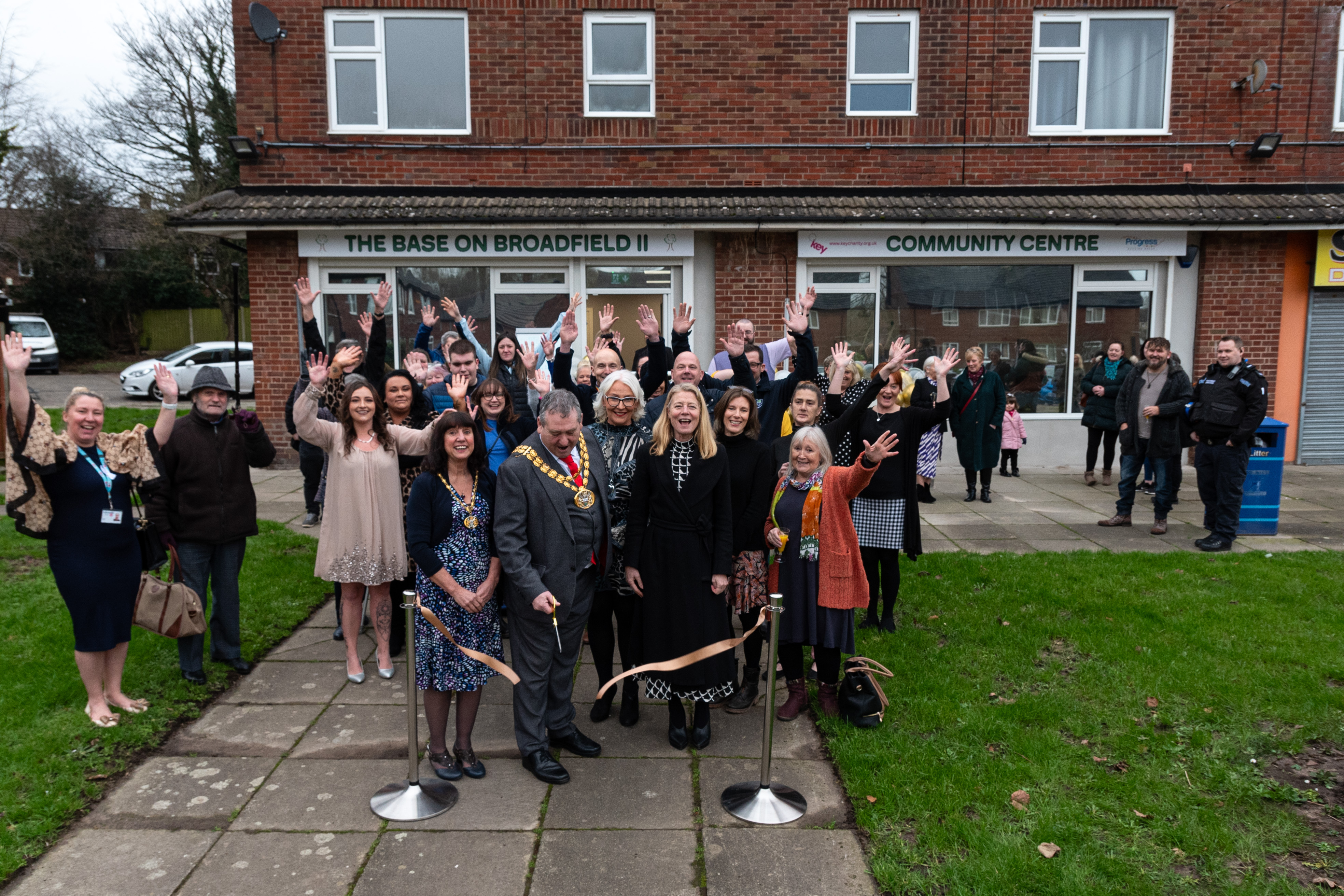
The Base II opening
Our original community centre, The Base I, has been operating since 2018 and has been described as a lifeline for families
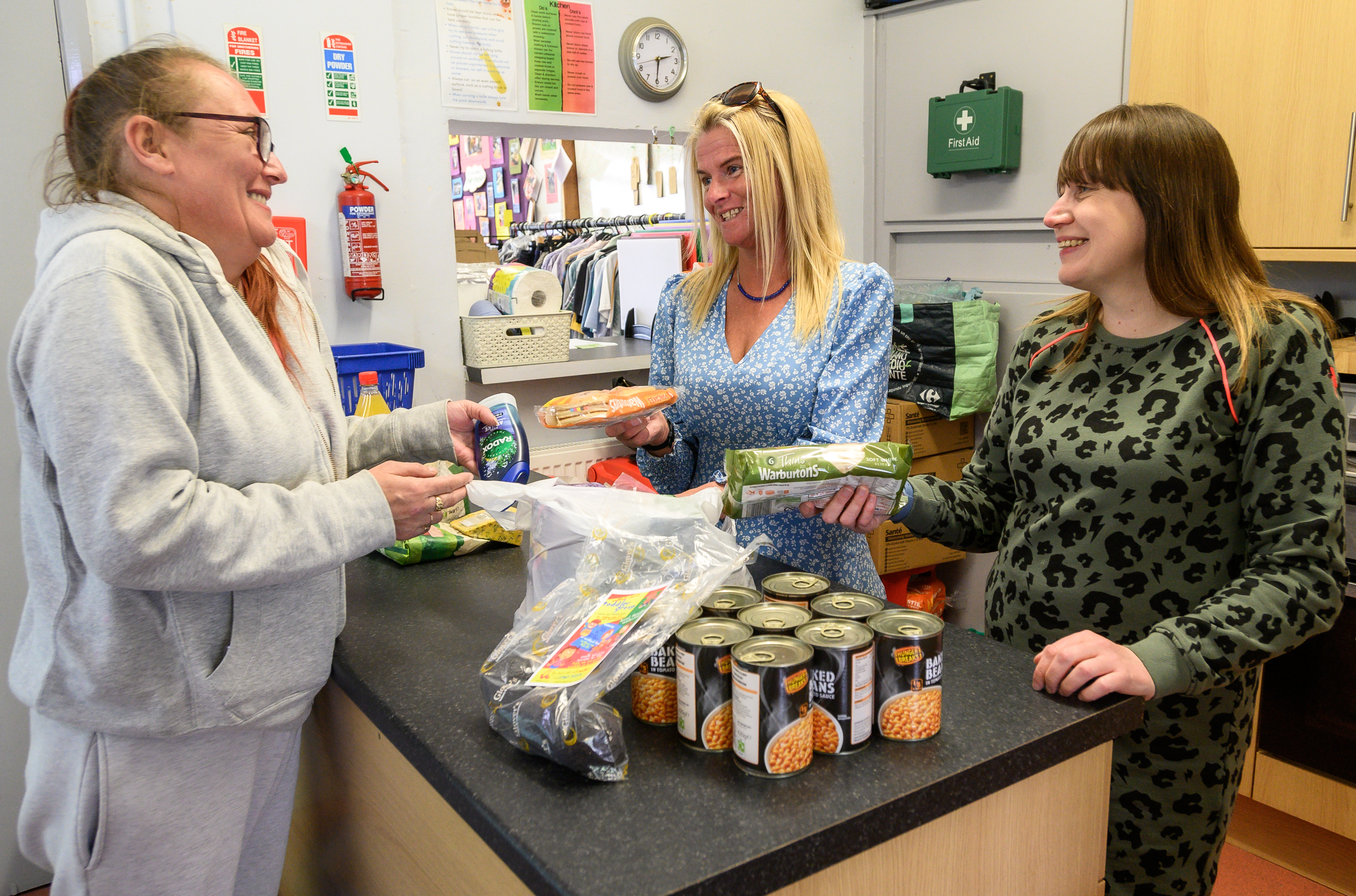
The Base I community shop
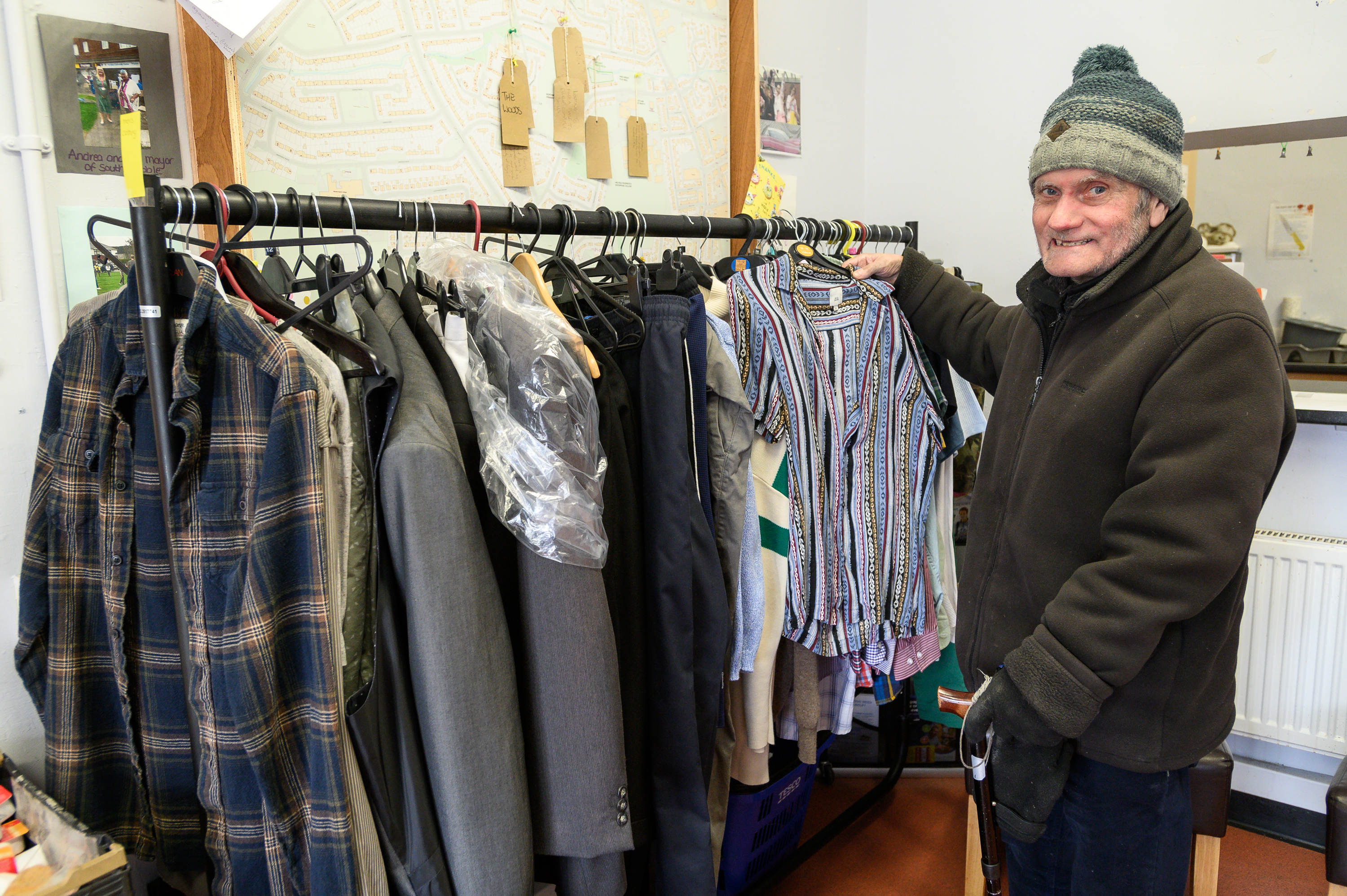
Clothes exchange at The Base I
Supporting wellbeing
We are here to help our tenants when things get hard, and to help them find new opportunities. We support our tenants with money worries, budgeting, finding jobs, apprenticeships and training, digital skills, and mental health and wellbeing.

Tenancy sustainability
Tenant Support Fund
The Tenancy Sustainability Team was launched in January 2024 to help new tenants settle into their homes financially and emotionally. The service offers up to 3 months of support, such as help with maximising income and benefits, setting up utility bills, budgeting advice, finding furniture grants, and general wellbeing support.
From January to March 2024, we handled and assisted with 57 cases. Additionally, 50 cases did not proceed due to properties being refused, offers withdrawn, or support being refused. In all cases, except for offers withdrawn, we made initial contact with 40 cases. The team also supports existing tenants in maintaining their tenancy by working with our charity Key to offer additional specialist support. During this period, Key received 13 referrals, 9 of which were active cases.
Our Tenant Support Fund has continued to provide substantial support to tenants.
We have approved 415 applications, with an average spend of £365 per person. This fund is designed to help tenants facing unexpected emergencies or one-time costs. The funds provided have been used for essential items such as food, fuel, domestic appliances, and furniture. For 2023/24, the fund allocated a total of £151,656.
This fund is designed to help tenants facing unexpected emergencies or one-time costs.


Tenant support and wellbeing service
We care about the wellbeing of our tenants. In January 2023, we introduced a specialised tenant wellbeing and support service in collaboration with Life & Progress.
This independent service provides free advice and support for adults living in our homes. It helps tenants facing challenging times maintain their tenancies by offering confidential and independent support to manage finances, maximise household income, tackle money worries, budget for household bills, find job and training opportunities, develop digital skills, and address mental health and wellbeing concerns. In addition, the service offers a helping hand to employees working in customer-facing roles. Employees can refer tenants needing support directly to the tenant support and wellbeing service.
Since its launch, the service has provided support 93 times. This included 41 phone calls, with 93% for immediate counselling and 7% for general advice and referral to external support. Concerns about family matters and finances were the most common reasons tenants contacted the service for support. The most researched topics were mind and body, home life, and money, followed by confidential care, work, and family. These direct insights from tenants are valuable in assisting us to adapt and improve the service to provide the right support. The Life & Progress service is integral to our improved tenancy sustainability offer.
Household support
We have partnered with South Ribble Borough Council to help our tenants access the Household Support Fund, which provides government funding to cover heating costs and other essential items in the area.
During 2023/24, we helped Progress tenants submit 62 applications for the fund. Of these applications, 34 were approved, totalling £29,604.82 in support funds. From this amount, £10,195 helped tenants pay their arrears, £9,630 went towards domestic appliances, and the remaining amount was used for furniture, carpets, and other essential items. We also assist tenants in accessing other forms of external funding, such as benefits and grants, and began recording these efforts in October 2023. From October 2023 to March 2024, we helped tenants access an additional £182,868 in benefits.
Supporting independence through technology
Progress Lifeline is our award-winning technology-enabled care service, supporting over 60,000 people. We provide personal alarms, emergency home response and lifting services, and other technology-enabled care services (TECS) to people with different health conditions. During the year, we handled over 1.3 million calls from people needing assistance.
Our Emergency Home Response service continues to grow, and our team now supports more than 25,000 people. The service attended 25,337 fall-related callouts throughout the year, of which over 11,000 resulted in an assisted lift for those not injured. Our attendance enabled 94% of the people we visited to stay in their homes without clinical intervention. We also referred 1,628 people to prevention services to ensure they have the support they need to remain independent.
This valuable service has helped reduce the demand for the Northwest Ambulance Service, enabling them to prioritise their emergencies. We now provide responder services throughout Lancashire, Yorkshire, Merseyside, Manchester, Herefordshire and Gloucester.
As an innovative service provider, we are also working with the NHS, supporting its recent community response pathways, which provide Integrated Urgent Care Clinical Assessment Services to people in their homes. Individuals who have had a fall but who are uninjured are referred to our service. This reduces pressure on the health service and enables more appropriate care to be provided closer to home without hospital admission.
We continue developing our technology and service offer, ready for the UK-wide telecommunication switch from analogue to digital in 2026. Over 60% of our customers have been moved to digital equipment as part of our swap-out programme.

We now provide responder services throughout Lancashire, Yorkshire, Merseyside, Manchester, Herefordshire and Gloucester.
A new digital call-handling platform and providing technology-enabled care across Lancashire
In September 2023, Progress Lifeline achieved a significant strategic milestone by implementing a new digital call-handling platform, UMO.
This platform enables our Alarm Response Centre to transition from analogue to digital in UK telephony networks, scheduled to be completed in early 2026. It will ensure that our services are future-proof and up to date with the latest technology to serve our customers better. It will also allow us to offer a broader range of services and equipment in the technology-enabled care and adult social care arena, which is crucial given the current economic climate.
With this new platform, we can expand our portfolio to provide proactive monitoring services such as artificial intelligence, daily activity monitoring, and digital medication management. We will also be able to introduce proactive fall prevention measures and at-home environmental monitoring for factors such as temperature and damp, which can help reduce the risk of health issues related to fuel poverty. All these measures aim to support our service users in staying safe and independent in their homes for longer. This will also reduce the strain on the NHS and other community health and social care organisations.
Following a competitive tender process, Progress Lifeline was selected as the preferred provider for the delivery of Lancashire County Council’s technology-enabled care (TECS) service, and the new contract started in November 2023.
Progress Lifeline has been working with Lancashire County Council for several years, collaborating with another provider for telecare services and directly providing emergency response and fall lifting services.
As the successful bidder, we are now the sole provider for over 8,000 service users. Our services include delivering TECS, emergency home response, and fall lifting services across Lancashire. Additionally, we provide training and raise awareness among health and social care employees across Lancashire to promote the appropriate use of TECS. We will also work on co-developing a data strategy to use data proactively for prevention initiatives.
Real stories
Mrs A
Mrs A, a 41-year-old mum of 3, began to experience mobility issues and pain after the birth of her daughter. After 3 years of tests, she was diagnosed with multiple sclerosis.
Over the past 12 months, her condition has worsened, and she now requires a wheelchair at home and a mobility scooter when going out. Her home has been modified with bathroom rails, and she now sleeps downstairs.
After assessing her needs, we determined that she would benefit from a personal alarm and telecare service. Mrs A now has the Progress Lifeline pendant and unit, smoke alarms, and access to emergency home response services 24/7.
Recently, Mrs A needed the emergency response service when she fell while trying to move from an armchair into her wheelchair.
Mrs A recalls, “I tried to get back up myself but couldn’t. My little boy was concerned about me as I had been on the floor for over an hour, and we were all becoming more upset, so he pressed the Progress Lifeline pendant button. The operator answered quickly and was very helpful. They said they would send an emergency home responder to my house, and he arrived quickly, within 15 minutes.
The responder Simon made sure I was uninjured and used a lifting chair called the Raizer to lift me back up. It was brilliant.”
Mrs A’s son says, “Knowing that we’ve got a button we can press if Mum falls, and someone will help us, is really good.”
The telecare sensors, Progress Lifeline unit and pendant and the emergency home response service all work together to ensure that Mrs A and her family continue to live together safely in their own home. This reduces the children’s worry and panic and provides peace of mind and increased confidence to the family.
Knowing that we’ve got a button we can press if Mum falls, and someone will help us, is really good.
Independent living and Extra Care
We have 30 independent living schemes across South Ribble and the Fylde Coast for people over 55. Each scheme offers self-contained apartments, communal facilities, support from an independent living coordinator, and 24-hour emergency assistance.
This year, we have continued to invest in and improve our independent living offer, responding to older people's changing needs and aspirations. We have also focused heavily on tenant feedback and collaboration.
We have started an ambitious 10-year programme to refurbish all our independent living schemes. Each scheme will be redecorated with new flooring. This project involves close collaboration between our Independent Living and Asset Management Teams, aiming to refurbish 3 schemes annually.
In collaboration with our tenants, we have created a plan to improve our repairs and gardening services, social activities, communication, and support for tenants with disabilities. This plan was developed based on direct feedback from tenants to ensure that their input is central to our service enhancements.
Work at our innovative new-build scheme in Lancaster is progressing. This is part of our commitment to transforming the provision of independent living and accommodation for those with Extra Care needs.
We have started an ambitious 10-year programme to refurbish all our independent living schemes.
Performance highlights
4,234
supported living properties across the UK
415
people supported by our emergency Tenant Support Fund
7,000
people supported by Key Unlocking Futures
68
young people and adults at risk of homelessness provided with safe accommodation
52
women provided with refuge from domestic abuse
60,000
people supported by our Progress Lifeline service











